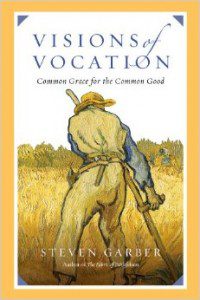This excerpt from Steve Garber’s book Visions of Vocation is the final one in our series reprinted here with the kind permission of InterVarsity Press. Get the book from IVP at this link!
One of the best chroniclers of contemporary geo-politics is the British novelist John Le Carré. From The Spy Who Came in from the Cold to Tinker, Tailor, Soldier, Spy, to Smiley’s People, to The Honourable Schoolboy, to The Constant Gardner, to The Most Wanted Man, to The Mission Song, he draws on his own years of spying for England in the MI5 and MI6 to tell his tales of the intelligence service through the Cold War and its end; in the years since then he has taken up global corporate machinations as the subject of his work.
Every story is remarkably engaging and sobering. A very gifted writer, Le Carré is brilliant, novel by novel taking up the most complex dynamics of the political economies of the modern world. If one story is Russia, post-USSR, with politicians full of malice doing business with kindred spirits in the West, another is Africa in all its hope and despair, with warring tribes set against global economic interests that profit when Africa suffers. Le Carré is a master story-teller, seeing the evil of the human heart played out in public and political arenas—and he expects his readers to come to the same conclusion that he has.
In a word, he is a cynic—about individuals and institutions, about persons and polities, about anyone and anything that has to do with power and money. And why not? There many good reasons to be cynical. Governments do betray their citizens, sometimes with tragic consequences. Nations do sacrifice long-term good for short-term gain, sometimes with intentional injustice written into the equation. People who really know what goes on in government and corporate bureaucracies have a very hard time not believing that everyone and everything is corrupt. They have seen too much. In Hitchcock’s inimitable image, they are men and women who know too much.
Le Carré captures this insightfully and eloquently. There have been many nights over many years when I have set his novels down, sure that the world is a better place because Le Carré has written another story. His sensibility about the nuances of the human heart rings true to my own heart and to people that I know. His instincts about motives, true and false, seem plausible, given what I have experienced. But there is also a sense of shame too, as I read him.
It is almost as if I have been a voyeur, looking in on life in a way that is illegitimate, a way that is intentionally perverse. Yes, I know that Bismarck, the Prussian politician, was painfully right about political life, about the human heart getting close to political realities, when he said that “if we want to respect sausage or law then we must not watch either being made.” But as I read Bismarck, there is a hard-won realism that is different than Le Carré’s cynicism.
Take The Constant Gardner, one of his novels, which also has become a film. It is about the world where global economic interests butt up against global health interests which butt up against global political interests. A complex and complicated world it is, and sausage-making is the reality that runs through the story. The British government has a part in the story, but a health crisis in Kenya does too, as does a British pharmaceutical company—and no one is clean, in fact, no one has integrity. The sausage has been made, and it stinks; it has made some people very wealthy, others have died from it. Only the naive refuse the logic of cynicism.
To keep going in the world, we cannot afford to be romantics. Even if we acknowledge that Pollyanna is fictional, we know the temptation and allure to imitate her. We do want all to be well, for all to be happy. “Life is good,” the T-shirts promise, and we buy them by the truckload. Well, sometimes in some places, but not very often in the massive ghettoes of Nairobi, which is where Le Carré takes us in The Constant Gardner. And when money and power are to be had, there are few who say no. Almost no one.
But there are exceptions. And it is here that Le Carré’s cynicism is more a protection of his heart than a truthful account of the heart. Whether conscious or not, intentional or not, the temptation to cynicism is always a way of keeping one’s heart from being wounded, again. Given my work and my city, I have watched scores of hundreds of twenty-somethings come to Washington, bright-eyed and bushytailed, ready for life, wanting to affect the way the world turns out. For most it does not take very long smelling the sausage being made. Before long, cynicism begins to grow as they see and hear more than they ever imagined.
But I have also watched many who are now older, seasoned as they are, who can remember a day when they too believed that justice was worth working for but who now know that it isn’t, because it only exists in university bull-sessions. After all, they are not twenty-one-year-olds anymore! They know how the world really works. And of course they are very willing to tell twenty-one-year-olds that they’d better get on with the real business of politics, which is using it for one’s own end. As one senior aide in the Senate told one of my students who had asked about the meaning of justice for a particular national debate in which his senator was a key participant, “Justice is crap! Grow up!” And for a half-hour he harangued her for even imagining that justice, inscribed though it might be on the buildings of Capitol Hill, had anything to do with Realpolitik, with the real business of politics. (Answering the question What is real? turns out to be more than an academic question, because how we define it has far-reaching consequences.)
There is much to be cynical about—and it is a good answer if there has not been an incarnation. But if that has happened, if the Word did become flesh, and if there are men and women who in and through their own vocations imitate the vocation of God, then sometimes and in some places the world becomes something more like the way it ought to be.
 Taken from Visions of Vocation by Steven Garber. Copyright (c) 2014 by Steven Garber. Used by permission of InterVarsity Press, P.O. Box 1400, Downers Grove, IL 60515-1426. www.ivpress.com
Taken from Visions of Vocation by Steven Garber. Copyright (c) 2014 by Steven Garber. Used by permission of InterVarsity Press, P.O. Box 1400, Downers Grove, IL 60515-1426. www.ivpress.com













